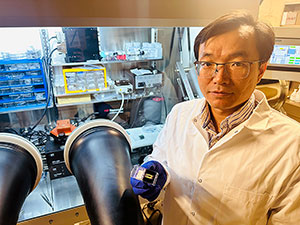
A research team has created an innovative method to control tiny magnetic states within ultrathin, two-dimensional van der Waals magnets — a process akin to how flipping a light switch controls a bulb. Imagine a future where computers can learn and make decisions in ways that mimic human thinking, but at a speed and efficiency that are orders of magnitude greater than the current capability of computers.
A research team at the University of Wyoming created an innovative method to control tiny magnetic states within ultrathin, two-dimensional (2D) van der Waals magnets — a process akin to how flipping a light switch controls a bulb.
“Our discovery could lead to advanced memory devices that store more data and consume less power or enable the development of entirely new t...
Read More







Recent Comments